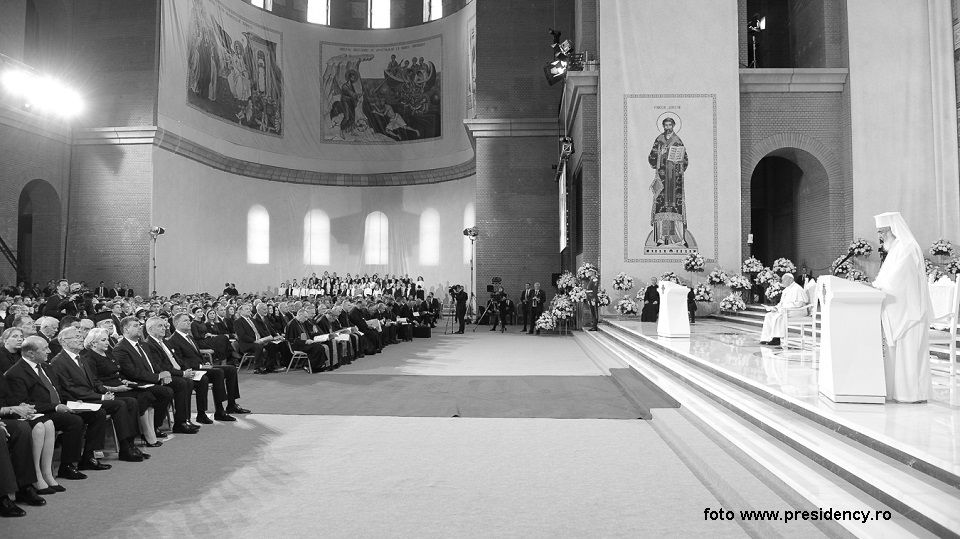January 25, 2017
Transparency International report:The rise of populist politicians in many countries is a reason for concern

Newsroom, 25.01.2017, 14:02
PRESIDENCY – Romanian President Klaus Iohannis on Wednesday addressed the plenary session of the Council of Europe’s Parliamentary Assembly. This is the central point of the President’s visit to Strasbourg. On Tuesday, Iohannis discussed with the Council’s secretary general, Thorbjorn Jagland, about consolidating the concrete cooperation with this institution. The Romanian President has announced that an international conference on the role of the majority and the opposition in a genuinely democratic society, organised jointly with the Venice Commission, will be held in Bucharest on April the 6th. In turn, Thorbjorn Jagland has hailed the important role that Romania plays as country that holds the presidency of the International Alliance for the Memory of the Holocaust. Iohannis met in Strasbourg with Romanians working at the Council of Europe and with representatives of the Romanian community in the region of Alsace. The head of state also attended a ceremony marking the International Holocaust Remembrance Day.
REPORT – The rise of populist politicians in many countries is a reason for concern, according Transparency International’s annual Corruption Perceptions Index made public today. Corruption and inequality feed off each other, creating a vicious circle between corruption, unequal distribution of power in society, and unequal distribution of wealth, the report says. “In too many countries, people are deprived of their most basic needs and go to bed hungry every night because of corruption, while the powerful and corrupt enjoy lavish lifestyles with impunity,” said José Ugaz, Chair of Transparency International. According to the report, what is urgently needed are deep-rooted systemic reforms that even up the growing imbalance of power and wealth by empowering citizens to stop the widespread impunity for corruption, hold the powerful to account, and have a real say in the decisions that affect their daily lives.
LAWS – Romania’s Higher Council of Magistracy, at the request of the Justice Ministry, is today looking into the draft emergency orders proposed by the government, on granting collective pardon and revising the Criminal Code. The Social Democratic Justice Minister, Florin Iordache, says that these emergency orders are needed in order to ease overcrowding in prisons. The countrys prosecutor general, the chief anti-corruption prosecutor, the Supreme Court, and the chief of the directorate fighting organised crime, as well as magistrates associations and civil rights groups are firmly against the move, arguing that there is a lack of transparency as to the legal framework regarding offences such as corruption, abuse of power and integrity. Tens of thousands of people marched the streets of the capital Bucharest on Sunday in protest at the government’s recent plans.
EC REPORT — Romania continues to make progress in reforming its judicial system and in fighting corruption, but the criticism levelled by politicians and the media at the judicial institutions, the National Anti Corruption Directorate in particular, risks undermining general trust in justice. This statement is part of the European Commission’s report on the progress made by Romania within the Cooperation and Verification Mechanism (CVM), presented today in Brussels. According to the document, the prosecution and conviction of Romanian top-level politicians proves that the judiciary’s tendency towards independence is positive.
INTELLIGENCE SERVICE – The Commission for the control of the Romanian Intelligence Service (SRI) is today hearing the institution’s leaders in relation to the Florian Coldea case and the SRI’s budget. We remind you that at the request of the SRI chief, Eduard Hellvig, the first deputy director of this institution, general Florian Coldea, was put in reserve, after he had previously asked that. According to a release of the Intelligence Service, Coldea took this decision for reasons of “dignity and military honour, and the risk of bringing serious damage to the institution’s work.” The move comes after a series of allegations against him launched by runaway Romanian businessman Sebastian Ghita. A SRI internal investigation found Coldea not guilty.
(Translated by Elena Enache)





























